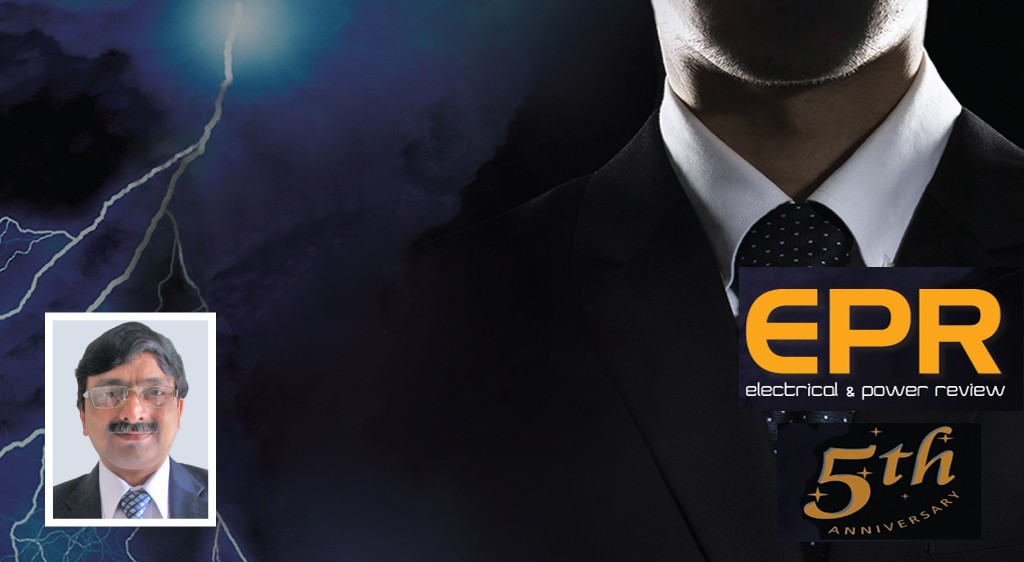Focus on achieving lowest energy cost
By EPR Magazine Editorial November 29, 2017 11:56 am IST
By EPR Magazine Editorial November 29, 2017 11:56 am IST

Rajiv Agrawal, Secretary, Indian Captive Power Producers Association (ICPPA)
Clearing ground work is must
Briefing whether government’s initiatives are delivering or not Rajiv Agrawal, Secretary, Indian Captive Power Producers Association (ICPPA) states, “Though the initiatives like UDAY, TARANG have been started for revival of power sector but progress is mainly visible on the initiatives that are for public consumption namely electrification, LED, solar power to far off places etc.”
He adds, “Though some works have been completed for splitting and monitoring feeder lines, smart meters at supply lines, but high 25-45 per cent transmission and distribution (T&D) losses (thefts) and revenue gap is derailing initiatives like UDAY. Already experts are pointing out that if ground work and operations are not done immediately, the financial turnaround due to UDAY may become a burden in next 2-4 years.”
Game changer is yet to emerge
According to Agrawal, it is difficult to pinpoint any one initiative that can change the game so early. “It is like expecting a 60-70 year old elephant to immediately attain low inertia and high speed like cheetah,” Agrawal admits.
The basic thinking has to shift away from existing reliance on cross-subsidisation of losses by increasing financial load on industry; keep covering wasteful and inefficient historical costs by PSU/ discoms/state by treating it as ‘Public Good’ just because national money has been invested and these sectors serve public; repeated efforts to prevent growth of alternatives like captive generation (CPP) and to throttle them down.
Initiatives towards improving health of the industry
As far as overall health of industry is concerned, improvements are being attempted at the cost of captive power and industrial energy needs, states Agrawal.
He adds, “Over a period of past 8-10 years, captive generation is constantly being sidelined due to pressure from various PSUs like Coal India Ltd (CIL), discoms etc, center and state governments are buckling under their pressure. In the last 3 years the pace and intensity of these attacks have only increased.”
According to Agrawal, discoms have even forced Power Ministry to:
• Last year to amend rules that define captive power so that on whole captive generation discom could get ‘Cross Subsidy surcharge’. They want to supersede even ‘Companies Act’ to control how a company is formed and funded.
• This year, to amend rules for ‘Open Access’ such that an industrial consumer will never be able to utilise ‘Open Access’ and has to draw power only from discom.
• Similarly, despite Electricty Act 2003 and New Coal Distribution Policy-2007 providing equitable non-discriminatory treatment to CPP and IPP.
• The coal supply to CPP is constantly being curtailed by CIL so that coal can be diverted to IPP.
Agrawal recommends:
On global comparison, Indian power cost is among highest bracket (on PPP); namely if a few diesel power based small nations with higher electricity prices are excluded. Similar is case of coal that is used for 70 per cent power generation.
• Let the nation decide that what to call a policy and its implementation that aims to sell Indian coal at highest cost linked to import landed price parity.
• All coal exporting countries sell coal at much lower cost than export price.
• It means that we want ‘India as Nation’ to pay to CIL and government a cost equal to foreign export price plus export tax and handling plus sea freight and import tax and handling.
• Indian coal mined by private sector costs Rs 350-450 per tonne. This is comparable to global values. However, average quality G-10 grade CIL coal is billed between Rs 1150-1800 PMT that is 3 to 5 times the Pit-Head cost that includes high CIL cost and 100 per cent to 150 per cent taxes.
• Even a basic economics text book tells that any price paid in real-dollar terms that is in-excess of PPP (Purchase Price Parity) is a burden on economy.
• However, under ‘National Goal to achieve Lowest energy Cost’, there will be little space left for arguments/logic like linking national energy cost with international energy-trading benchmarks floated by Trans-National Traders.
• Lowest prices (that remain remunerative to efficient producer) always benefits industrial and retail consumers, while traders’ interest is served by increasing cost.
• Off course, in this case it will be difficult to support inefficiencies of PSU like CIL, NTPC through policy framework that have thrived by increasing the costs.
“For the time being we are not debating higher excise on petroleum products that has kept the demand expansion suppressed and thus imports,” Agrawal points out.
He said, “De-linking content and carrier can be good candidate that needs to be expedited to bring transparency, improve efficiency and bring competition to reduce prices. However, we may not at-all be ready for these three concepts if we look at fate of Open-Access to consumers.”
We use cookies to personalize your experience. By continuing to visit this website you agree to our Terms & Conditions, Privacy Policy and Cookie Policy.